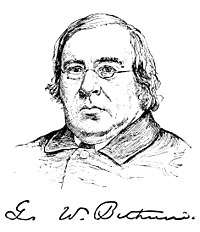George Washington Bethune
George Washington Bethune (March 18, 1805 – April 28, 1862) was a preacher-pastor in the Dutch Reformed Church.

Of Huguenot descent, his father was Divie Bethune, a highly successful merchant in New York.[1] Originally a student at Columbia College of Columbia University, Bethune graduated in 1822 from Dickinson College, Carlisle, Pennsylvania and went on to study theology at Princeton University. He married Mary Williams in November, 1825.
In 1827, he was appointed Pastor of the Reformed Dutch Church, Rhinebeck, New York. In 1830, he moved to Utica, New York; in 1834 to Philadelphia; and in 1850 to Brooklyn Heights, NY. He was offered the chaplaincy of the U.S. Military Academy, the Chancellorship of New York University and the Provostship of University of Pennsylvania, all of which he declined.
He was an outspoken Democrat in politics, opposed to slavery but unsympathetic to abolitionism.
Due to his Calvinist ideas about the unsuitability of such a hobby for a clergyman, Bethune, an avid fisherman, worked anonymously on five of the US editions of Izaak Walton's The Compleat Angler under the pseudonym The American Editor.[2]
He also wrote many hymns, some of which are still used today. One popular hymn he wrote is "There is no Name so Sweet on Earth." The hymn "When Time Seems Short and Death is Near" was found in his portfolio and was written on April 27, 1862, the day before his death.
While visiting Florence, Italy for his health, he fell ill after preaching and died of a stroke on April 27, 1862. His Life and Letters were edited by A. R. Van Nest, 1867.
Published works
- The Fruits of the Spirit (1839)
- Sermons (1847)
- Lays of Love and Faith (1847)
- The Complete Angler (Isaac Walton), first American edition (1847)[3]
- The British Female Poets (1848)
- Orations and Discourses (1850)
- Expository Lectures on the Heidelberg Catechism (1864) 2 vols.
References
- Julian, John (June 1907). A Dictionary of Hymnology. London: John Murray. pp. 138–139.
- Encyclopedia Dickinsonia. "George Washington Bethune, Class of 1823". Dickinson College. Archived from the original on 2006-10-12. Retrieved 2007-01-28.
- Christian History Institute. "George Washington Bethune Came on Stage". Archived from the original on 2005-12-01. Retrieved 2007-01-28.
Notes
- Appletons' annual cyclopaedia and register of important events of the year: 1862. New York: D. Appleton & Company. 1863. p. 192.
- Kohrman, Robert (Summer 1987). "Checklist of Angling Pseudonyms". The American Fly Fisher. Manchester, VT: American Museum of Fly Fishing. 13 (4): 22–26.
- Westwood, T.; Satchell, T (1883). Bibliotheca Piscatoria-A Catalogue of Books on Angling, The Fisheries and Fish Culture with citations touching on angling and fishing from old English authors. Covent Garden, London: W. Satchell. p. 370.
External links
| Wikiquote has quotations related to: George Washington Bethune |